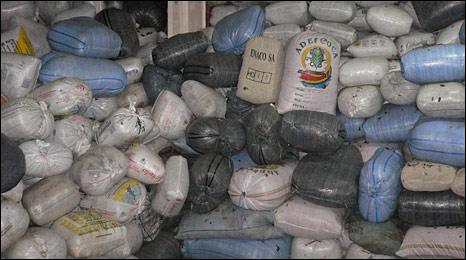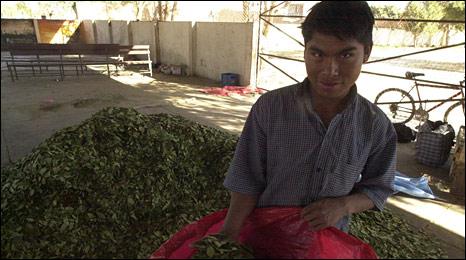Cocaine production rise spells trouble for Bolivia
- Published

In a basement in La Paz used as an improvised warehouse, millions and millions of coca leaves - cocaine's raw material - are stockpiled in white, grey and blue bags.
The leaves were seized in numerous operations by Bolivia's police to stop them reaching cocaine producers.
But Bolivia's anti-drugs chief Felipe Caceres warns that "we are running out of storage space".
For many in Bolivia and elsewhere, this is clear proof that the country's cocaine industry is growing at an alarming rate.
There is further evidence. Cocaine seizures have been increasing and laboratories using processing methods long used in Colombia are mushrooming.
And, for the first time in Bolivia, there is drug-related violence.
Recent months have seen a number of shoot-outs between gangs of drug-smugglers.
"We are seizing more and more [cocaine], and more and more traffickers, that are increasingly violent. That's true; we cannot deny that," the head of Bolivia's anti-drugs force, Col Felix Molina, told the BBC.
"The processing labs are increasingly sophisticated and can produce more and more cocaine."
Jose Carlos Campero, a leading political economist, says cocaine trafficking is already a major problem and will continue to be so for the next decade.
"We've seen a 70% growth in the cocaine industry in recent years. That means that, today, the coca-cocaine circuit is the third largest source of revenue for the country, right after the exports of traditional products such as hydrocarbons and mining."
Re-think
From Colombia and Peru through Mexico and on to several West African states, the cocaine trail is littered with violence.
That is not yet the case in Bolivia, but the recent shoot-outs are ringing alarm bells.
"What we fear are the increasing levels of violence; we fear this could turn into something similar to what Colombia was suffering 10 years ago, or what Mexico is suffering right now", Mr Campero says.
The violence is forcing a partial re-think of the drugs policy adopted by President Evo Morales since he came to power in 2006.
Like many in the indigenous Indian community, Mr Morales grew coca for traditional uses - such as tea, medicine and indigenous rituals - and, as president, he has allowed cultivation for such purposes.
He is also a critic of Washington. He has summed up his attitude several times in public, saying: "Long live the coca leaf, death to the Yankees."
Two years ago, he expelled the US anti-drugs agents invited in by previous presidents and made local security forces entirely responsible for all rooting out the cocaine business.
It is a policy of "zero cocaine but not zero coca". But Bolivian police are struggling to contain the spread of cocaine production in what is a strikingly poor country.
UN, US and independent local studies estimate that coca is being grown illegally on around 30,000 hectares.

The coca leaf is an important part of Bolivian culture
Many believe more coca will inevitably mean more cocaine.
Since the early 1980s, Bolivia has been the world's third-largest producer of cocaine after Colombia and Peru, with Europe as its main market.
But now increasing amounts of cocaine are being produced in Bolivia, as Colombian producers set up shop deep in the Bolivian jungle.
"The situation is in danger of getting out of control… we are very worried," European diplomatic sources told the BBC.
They added that, in their view, the departure of US agents has left Bolivia vulnerable to the emergence of drug cartels in isolated coca-growing areas.
Bolivian anti-drugs forces acknowledge the scale of the battle.
"We are doing the best we can, but we lack resources and we feel abandoned by the international community, and this should be a concern for them," says Col Molina.
President Morales has recently responded by turning to an old friend and big neighbour, Brazil, and one of Bolivia's newest allies, Russia.
Russia is set to supply helicopters to Bolivia to help in the fight against the illegal drugs trade while Brazil, another major destination for Bolivia's cocaine, will help with intelligence and anti-drugs forces.
However, with new foreign help or not, the reality is that in one of South America's poorest countries coca leaves fetch far higher prices than most food crops.
The temptation to sell them to the highest bidder is hard to resist.
"Fighting drug criminals is difficult," says Col Molina. "But what it is even more difficult is fighting people who are trying to get out of poverty."
- Published13 June 2010